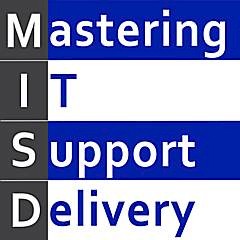This 4-day Training course & corresponding study in this qualification provides a philosophical approach along with skills and practices in the design, construction, and implementation, of an end-to-end, cross-department, IT user and systems support strategy. The methods described here are… READ MORE
(Prices exclude VAT which will be added at the prevailing rate.)

This 4-day Training course & corresponding study in this qualification provides a philosophical approach along with skills and practices in the design, construction, and implementation, of an end-to-end, cross-department, IT user and systems support strategy. The methods described here are applicable to ‘greenfield’ service invention or to the re-engineering of an existing provision. This high-level consideration makes it equally pertinent in both ITSM (corporate internal user) and ECSM (External Customer Support Management) contexts.
With the strategy implemented, the skills also pertain to orchestration of the service at the level of manage-the-managers. Thus it includes service level achievement, resource deployment, strategy compliance and productivity expectations; along with the required operational managers’ responses to these via cascade reporting.
Candidates should be able to demonstrate knowledge and understanding and application of principles and techniques in the following areas:
Organisational
Most IT departments attempt to operate without an IT Support Strategy. The typical alternative to strategy is usually a passive approach. It invariably consists of a named front line such as a Service Desk, passing reported IT issues to other parts of IT which have no formal support responsibility other than that implied by their skillsets or the systems under their charge. Without an effective IT Support Strategy, there may be only limited consideration of IT Support as a whole, despite the reality that IT Support is what most IT users think of when they think about IT at all. This qualification is designed to acknowledge this broader reality of IT support and provide structured education in acting appropriately towards it.
The frequent results of IT’s commonly fractured approach include un-coordinated workloads, distorted priorities, silo-ism and its associated communication problems, inappropriate or duplicative staffing, inefficiencies, waste, interruptions to the primary duties of technical workgroups, and under-performing services for the business, thus adding costs and risks. Service measurement tends to be limited to after-the-fact fix times (known as ‘Service Levels’), with little to no consideration of how a given service level is achieved or adjusted. In absence of support strategy, the service is silo-to-silo, not end-to-end. Its focus is upon itself, not the service to the user. Its only measurement is arbitrary and historical, not real-time and throughput-oriented. This training defines a function that replaces this organic fragmentation with considered and managed design.
IT support affects the whole of IT, and its main purpose is maintaining or restoring user productivity. Technical considerations are only a means to that end. To be done properly, IT support needs a strategy, to take it beyond being a collection of groups of technical specialists and into acting as a co-ordinated, purpose-designed production facility. This unique syllabus describes the detail and practice of designing and managing a strategic approach to corporate IT support provision.
Individual
At the level of Support Strategy Manager, we move beyond the considerations of the operational workgroup head into the more complex area of the management of managers. Here we are designing the whole service and how it must be delivered. This is potentially the ultimate job satisfaction, the absolute responsibility for the recognition of need and the creation of a mechanism to meet it.
Management of managers is a highly portable skill for the career-conscious. For the successful candidate in the smaller organisation, the skill is scalable to the larger organisation. Once there, the skill is still needed at the level of the corporate director.
The Support Strategy Manager certificate is more than just an education in high-level design and implementation, but a potential enabler for career advancement.
Senior IT managers with actual or potential cross-departmental responsibilities for support delivery
Pre-Requistes
Pass at MISD Career Level 3 Operational Manager Certificate
Examination format
In classroom invigilated by tutor
Dates for this course are available on request. Please Contact Us for details.